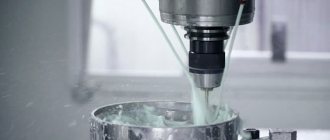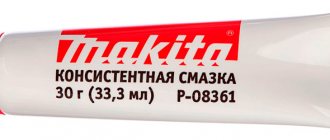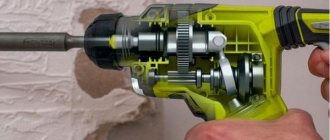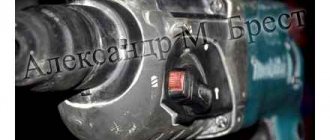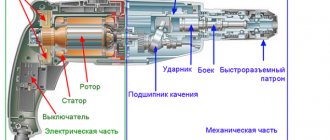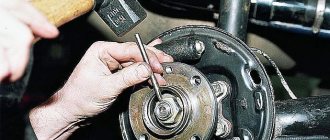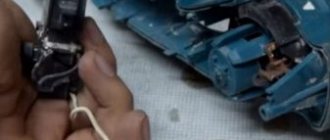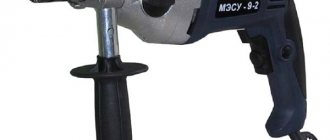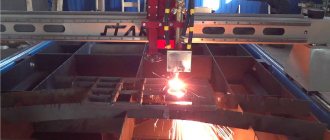How long a hammer drill will last largely depends on proper care and compliance with operating requirements. One of the main stages is the periodic lubrication of the tool and its main components.
The more often and better the lubrication, the greater performance and service life you can expect from a power tool. By treating it with special compounds, it preserves surfaces, reduces loads and friction.
But it is still not recommended to use the first lubricant you come across. It is possible that due to the wrong choice you will only provoke a quick failure of the unit. Therefore, you need to clearly understand how and with what you need to process the parts of the hammer drill.
The concept of perforating lubricant
Perforating lubricant is an oily, viscous substance that has a yellow tint and a specific odor. The main purpose of the product is to reduce the friction force between the moving elements of the unit during its operation.
During operation of a power tool, wear products, as well as dust and dirt, begin to get into the lubricant. As a result, the composition loses its operational and physical-chemical properties. For these reasons, the composition should be updated periodically. That is, lubricate again, following all the rules.
If you ignore this recommendation, the device will begin to experience a shortage of lubricant. As a result, overheating will occur, and then complete failure. But an excess amount of the substance also poses a threat. The drill speed drops, which affects performance.
When choosing a lubricant, the hammer drill user must pay attention to the composition and characteristics of the power tool itself.
Which components need to be lubricated?
If you look at the instructions for use, it will be said that 3 elements of the device are subject to periodic treatment with lubricants. This is necessary to increase the efficiency of the device, as well as to increase its service life.
These 3 elements include:
- working equipment;
- cartridge;
- gearbox
Moreover, each component has its own nuances.
Tooling area
Includes crown and drill. These elements are subject to increased load during operation. It is with their help that it is possible to process hard materials and surfaces.
Most instructions state that the tooling, or more specifically the drill shank, must be lubricated with each use. If the hammer drill works during the day, the master must periodically check the presence of lubricant in this unit.
It wouldn't hurt to look at the instruction manual for your specific hammer drill model. It shows in detail exactly how lubrication is carried out.
Most often, the product is applied to the grooves with which the locking wings are fixed. But before adding the product, first use a dry cloth to remove any remaining old grease. Don't forget to remove dirt and dust. Next, the product is applied and evenly distributed over the surface. Typically, more than 1 gram of the composition should not be applied.
Cartridge
Now to the question of treating the hammer drill chuck with lubricant. The piston requires lubrication. It is important to consider that on new tools the chuck is dry.
So, before putting it into operation, it is necessary to apply the product to the place where the equipment is installed. When a hammer drill operates, it is in this area that the greatest friction occurs.
Proper care of a drill with a hammer drill function
A hammer drill is a hybrid of two types of equipment used to create holes in various materials. Unlike the classic impact drill, this drill has some design flaws that make maintenance more difficult and inexpensive. These disadvantages include, in particular:
- lack of a special container into which the lubricant is poured;
- the difficulty of servicing the cartridge due to the peculiarities of its design.
The main care for a drill with the functions of a hammer drill is that after each use of a drill of such equipment (including the shank), it is necessary to thoroughly clean the drilling waste and before inserting such a tool into the drill, it is necessary to apply a small amount of lubricant to its shank ( You can use regular lubricant).
Excess lubricant on the shank will not damage the tool and equipment being used, but may adversely affect the appearance of the surface being drilled by causing excess lubricant to spray out of the rotating chuck.
As a rule, drills with hammer drill functions are purchased for home use, since their price is quite affordable and they are quite suitable for their functions when carrying out simple repairs in the house. Even though these power tools have the features mentioned above, maintaining a rotary hammer does not require much time or hassle even for inexperienced users.
Gearbox
The element is necessary in order to transmit a torque impulse to the cartridge from the electric motor.
Peak load on the gearbox occurs precisely during operation at high speeds. The temperature rises significantly, which affects the effectiveness of the lubricant. As a result, the performance of the lubricant gradually decreases and must be renewed.
To do this, the housing should be disassembled, then evenly apply a layer of oil.
If we talk about which lubricant is preferable to use specifically for the hammer drill gearbox, then the optimal choice would be a proprietary composition. That is, a lubricant designed for a specific brand of power tools. Most manufacturers offer appropriate consumables to service their electrical appliances.
Causes of equipment overheating
If the hammer housing in the gearbox area constantly overheats, it is imperative to find the cause of the overheating and eliminate it. The most common causes of overheating are:
- Excessive gearbox lubrication. Excess must be removed.
- Lack of gearbox lubrication. Occurs during prolonged continuous use in chiselling mode. It is necessary to add a lubricant to the gearbox.
- Clogged air openings. In this case, air cooling stops working. It is necessary to clean the holes with a wooden stick or blow with compressed air.
In any case, you should stop working and let the mechanism cool down.
If the cause is eliminated, you must first let the device run idle or in drilling mode to allow the lubricant to be evenly distributed over the rubbing parts.
How to choose the right lubricant
Beginner users of power tools are interested in how to lubricate the gearbox and other elements of the hammer drill. The best thing to do here is to look at the instruction manual.
It is in the instructions that the manufacturer must indicate which lubricant should be used for each model of hammer drill.
Until the warranty period for the device has expired, you must use only certified products. Otherwise, the service center will refuse to fulfill warranty obligations.
And the question of which lubricant is preferable to lubricate this or that hammer drill still remains relevant. The reason is the high cost of original consumables.
As a universal product, you can imagine oil that is intended for diesel engines. Also common were compositions with graphite as a base.
Special lubricants can also be replaced with regular lithol or grease. The most widely used is Litol-24.
If we are making the top 10 among lubricants that are perfect for lubricating a hammer drill, then here we can highlight the products of the following brands:
- Makita;
- Bosch;
- Matabo;
- Al-Ko;
- Lumberjack Premium;
- VMPAauto;
- Patriot;
- Elitech;
- Bison
It is important to take into account that special types of lubricants are used for hammer drills and gearboxes, which differ from each other. In other words, drill lubricant cannot be used to process the gearbox. And gear lubricants are not suitable for servicing the drill.
Types of lubricants and requirements for them
To ensure uninterrupted and long-term operation, you need to know not only how to lubricate the tool, but also what exactly can be used.
The use of the same mixture for the drill and gearbox is prohibited. Otherwise, the device will quickly fail.
Means for drills
When purchasing a power tool, a special lubricant used to treat the drill should be included in the kit. It is characterized by increased density.
The instructions also indicate how to properly apply the product to the drill and how often this should be done.
When the lubricant from the kit runs out, the user can switch to products from another manufacturer. Just don't forget about the warranty period. Until its completion, it is better not to take risks and remain faithful to the official means.
When choosing an analogue, consider whether the composition is suitable for a specific hammer drill model and whether it can be used to process the drill.
Gear Lubricants
If the power tool is new, then you don’t need to think about replacing or adding lubricant yet. There is enough lubricant from the factory for the tool to work smoothly for about 1 year. But then re-processing will be required. The kit does not include lubricant for the gearbox. But there are original products and analogues that are perfect for such tasks.
The following properties are characteristic of gear lubricants:
- increased adhesion;
- moisture resistance;
- resistance to corrosion processes and rust formation;
- collection and disposal of accumulated waste;
- formation of droplets at elevated temperatures;
- restoration of operational characteristics after heating and cooling.
Potentially, litol, solid oil, and also nigrol can be used to lubricate the gearbox of an actively used hammer drill. These are quite effective consistency compositions. But they are more suitable as a temporary option when it is not possible to use a full-fledged tool for processing the rotary hammer gearbox. These lubricants are a more suitable choice when servicing household appliances and automotive components.
Rules for applying lubrication
Decide exactly what you will lubricate your hammer drill with, and also prepare the required amount of lubricant.
The procedure then looks like this:
- Clean the tool from any remaining dust, dirt and other debris. It is recommended to do this before disassembling so that debris from the surfaces does not get into more sensitive components.
- Carefully remember exactly how the components of the power tool are located. Assembly must be performed strictly in reverse order. It is important that each component is in its place.
- If you have just finished working with a hammer drill, you cannot immediately start lubrication. Wait for the instrument to cool down. Otherwise, cold oil that gets on the hot elements of the device can cause problems and malfunctions. The lubricant may simply not perform its functions.
- Next, disassemble the hammer drill into its components. The gearbox and drill must be removed, then washed in clean gasoline and wiped dry.
- Next, apply a special lubricant. Still, the best solution would be branded lubricant. The manufacturer developed it specifically for a specific device. In fact, this is a guarantee that the tool will work correctly after treatment.
- After completing the application procedure, reassemble the device in reverse order.
Having finished servicing the hammer drill, which you can do yourself without any problems, you can continue active operation. Properly applied lubricant will not require replacement for another 6-12 months.
As you can see, you can lubricate the device yourself and continue to use it for its intended purpose. Just keep in mind that if you ignore maintenance rules for a long time, as well as if you use lubricants that do not meet the requirements, the hammer drill may fail. If the main elements are severely worn, even branded lubricant will no longer help. This will require more serious intervention in the form of repairs, replacement of components, or even the purchase of a new power tool.
How often do you lubricate and maintain your hammer drill? What product do you use? Do you think it’s right to use branded products? Or are the analogues no worse?
Rotary hammer working equipment
The instructions for the mechanism always contain an urgent requirement to lubricate the shank of the replacement tool. The drill can withstand high dynamic loads of thousands of beats per minute.
During continuous operation, the operator must regularly lubricate the drill shank with lubricant - without this, the drill will overheat and break. Caring for a rotary hammer is a painstaking job.
Proper installation is done in the grooves that house the spindle wedges. It is important to clean them of debris and sand, and then add a small amount of lubricant. When removing a drill or bit, it is always necessary to renew the lubricant layer: fractions of a gram are enough.
Hammer chuck
Initially, this unit does not have its own protective coating. Before starting work, apply 1-2 grams of coolant.
The processing area is the supporting surfaces for interchangeable tools. This is where colossal friction and shock loads arise that can damage the cartridge. In addition to active protection, passive protection is also achieved: a layer of substance will cover the internal device from the penetration of dust and small particles.
Hammer gearbox
This mechanism is the main one in a power tool (after the engine, the rotation of which it transmits to the working tool). Operating conditions of the gearbox: constantly changing speed and torque, strong friction and increased heating from it. To this you need to add penetrating dust and a little dirt - the gearbox is under constant stress.
Lubrication of the rotary hammer-reducer is carried out by applying a substance to the internal surfaces, especially after long-term operation. Bearings and shafts are protected in the same way. During long-term use, it is important to lubricate the impact drill gearbox.
